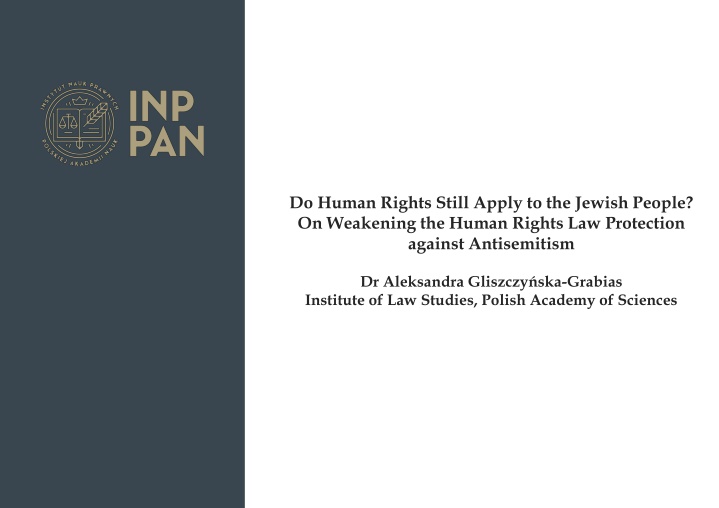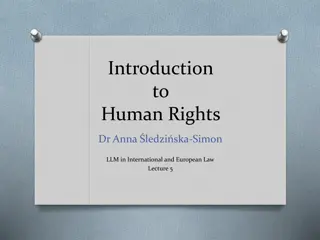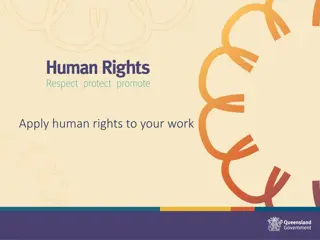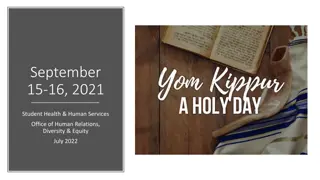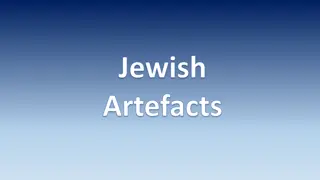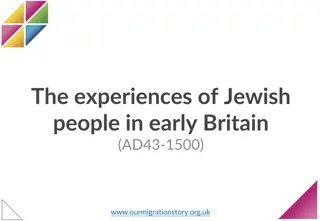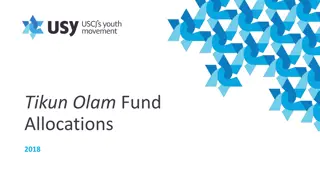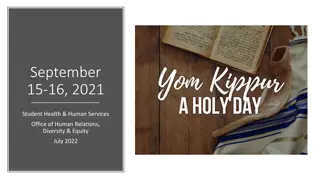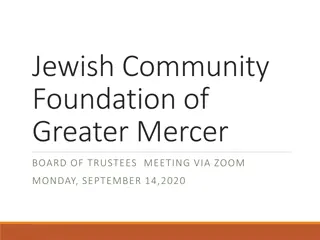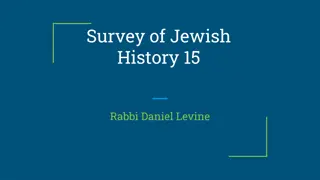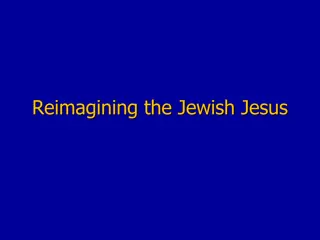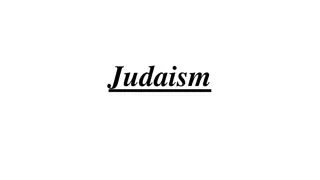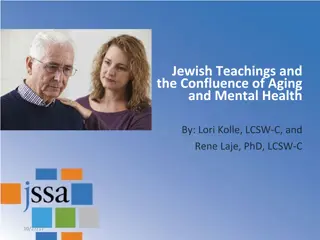Do Human Rights Still Apply to the Jewish People? - On Weakening the Human Rights Law Protection against Antisemitism
This article by Dr. Aleksandra Gliszczyska-Grabias explores the application of human rights to the Jewish community and the potential impact of weakening legal protections against antisemitism. It delves into the complex intersection of human rights law and antisemitism, offering valuable insights into this pressing issue.
Download Presentation

Please find below an Image/Link to download the presentation.
The content on the website is provided AS IS for your information and personal use only. It may not be sold, licensed, or shared on other websites without obtaining consent from the author.If you encounter any issues during the download, it is possible that the publisher has removed the file from their server.
You are allowed to download the files provided on this website for personal or commercial use, subject to the condition that they are used lawfully. All files are the property of their respective owners.
The content on the website is provided AS IS for your information and personal use only. It may not be sold, licensed, or shared on other websites without obtaining consent from the author.
E N D
Presentation Transcript
Do Human Rights Still Apply to the Jewish People? On Weakening the Human Rights Law Protection against Antisemitism Dr Aleksandra Gliszczy ska-Grabias Institute of Law Studies, Polish Academy of Sciences
Antisemitism: perhaps the most ancient and persistent manifestation of human rights violations The fight against antisemitism has given wings to the international human rights movement in the 20th century Historically, however, both in the "ages of faith" and in the "ages of reason" law was used not for protection, but for social and cultural isolation, religious or racial stigma, and, in the most drastic cases, for physical extermination of Jews. 19th/20th century: No civil rights for Jews in Switzerland No access to public service for Jews in the UK Pogroms in Russia and Central and Eastern Europe Ghetto benches in Poland Nuremberg Laws of 1935
The name United Nations was coined to describe the alliance fighting to end that barbarous regime, and our Organization came into being when the world had just learnt the full horror of the concentration and extermination camps. It is therefore rightly said that the United Nations emerged from the ashes of the Holocaust. And a human rights agenda that fails to address anti-Semitism denies its own history. Kofi Annan, UN Secretary General, 2004 Your presence reminds us about our raison d' tre, about our roots and hopes. Indeed, the very concept of the Council of Europe would not have arisen without a cataclysm, what was World War II, without Shoah and racist lessons of the totalitarian wave that swept across Europe. Hans-Christian Kr ger, former Council of Europe Deputy Secretary General, 2000
http://www.focusonisrael.org/2008/02/20/durban-2001-per-rinfrescarci-la-memoria/http://www.focusonisrael.org/2008/02/20/durban-2001-per-rinfrescarci-la-memoria/
Attempts to deprive antisemitism of its true meaning At the 5th session of the UN Human Rights Council, when delegates discussed the report of the Special Rapporteur on racism, a representative of Algeria argued that antisemitism should not be related to Jews only but to all Arabs. UN Human Rights Commission: representatives of Lebanon, Egypt and Syria and the Palestinian observer spoke many times of true antisemites, i.e. Jews, about hijacking of the term antisemitism by Jews, about Arab victims of antisemitism irrelevance of the accusation of Egypt of anti-Semitism since the Egyptians themselves are Semites to a much larger degree than Jews.. and about the
Dr. Ahmed Shaheeds, the UN Special Rapporteur on Freedom of Religion or Belief, 2019 historic report on antisemitism states that some antisemitism stems from religious narratives ( collective guilt for the murder of Jesus ) and expressions of contempt for the Jewish religion (including the false allegation of ritual murders ); rejects use of negative stereotypes like those in the discredited forgery The Protocols of the Elders of Zion, which underpin modern conspiracy theories ; confronts and rejects politicization of antisemitism: individuals claiming to hold anti-racist and anti-imperialist views employ antisemitic narratives or tropes while expressing anger at policies or practices of Israel ; in some cases, individuals expressing such views have engaged in Holocaust denial; in others, they have conflated Zionism, the self-determination movement of the Jewish people, with racism ; it is never acceptable to render Jews as proxies for the Government of Israel.
BDS as a systemic violation of human rights law Coordinated, organized actions of BDS against Israel and Israeli products, academics, students or institutions, which receive great media coverage and are being represented as resistance movement against drastic violations of human rights by Israel, lead to multiple breaches of human rights and freedoms of persons not only associated with or connected to the state of Israel but all persons with Jewish background, in the sense of their national, ethnic or religious origins. As a result of BDS, these persons experience discrimination, persecution, exclusion and intimidation. Their rights to personal dignity, safety, and often to freedom of expression, assembly and association are violated. Frequently, prohibitions on hate speech are breached, and often boycott actions have the character of incitement to hatred, based on ethnic or national origins.
European Court of Human Rights on BDS: 2009 In 2002 Jean-Claude Willem - the mayor of the municipality of Seclin, in France, during a session of the town council and in the presence of journalists, announced that the municipal catering services will boycott Israeli products, in order to protest against what he considered anti-Palestinian policies of the Israeli Government. Representatives of the Jewish community filed a complaint with the public prosecutor, who charged Willem with inciting discrimination on national, racial, and religious grounds. Willem was first acquitted but sentenced on appeal and fined 1,000 euros. His appeal against conviction was unsuccessful. In his complaint lodged to the ECtHR Willem claimed that his call to boycott Israeli products was part of a political debate concerning the Israeli-Palestinian conflict and was a matter of general and public interest. He complained that his conviction had thus constituted a violation of his right to freedom of expression within the meaning of Article 10 of the European Convention.
European Court of Human Rights on BDS Willem had not been convicted for his political opinions but for inciting the commission of a discriminatory act. He had not stopped at denouncing the policy of Ariel Sharon s government, but had gone further and called for a boycott of food products from Israel. French Court of Cassation had taken into account not only the call for a boycott made at the council meeting but also the message posted on the municipal Internet site, which had aggravated the discriminatory nature of Willem s position. In his capacity as mayor Willem was in charge of spending public funds, and thus he should not advocate spending them along the lines of a discriminatory logic . Willem s intention may have been to protest against the policy of Israel s Prime Minister, but the reasons given for the boycott were discriminatory and therefore reprehensible. No violation of Article 10 of the European Convention on Human Rights
European Court of Human Rights on BDS: 2020 The applicants were members of a local collective supporting BDS. They were prosecuted for calling on customers in a hypermarket not to purchase products from Israel, under a subsection of the Law on Freedom of the Press prohibiting incitement to discrimination against a group of persons on account, inter alia, of their origin or belonging to a specific nation. The applicants were acquitted at first instance but on appeal a suspended fine of one thousand euros was imposed on them, and they were ordered to pay damages to the associations appearing as civil parties.
European Court of Human Rights on BDS: 2020 A boycott is primarily a means of expressing a protest: a call for a boycott, is in principle covered by the protection set out in Article 10. Incitement to discrimination is a form of incitement to intolerance, which, together with incitement to violence and hatred is not covered by free speech protection. Nevertheless, incitement to necessarily the same as incitement to discrimination. The applicants had not been convicted of making racist or antisemitic remarks or inciting to hatred or violence. Nor had the hypermarket claimed damages before the domestic courts. The actions and remarks imputed to the applicants had concerned a subject of public interest: compliance with public international law by the State of Israel and the human rights situation in the occupied Palestinian territories. The actions and remarks in question had fallen within the ambit of political expression. It was in the nature of political speech to be controversial and often virulent. differential treatment is not
European Court of Human Rights on BDS: Willem v. France v. Baldassi and others v. France In Willem the applicant had been acting in his capacity as mayor and using mayoral powers regardless of the duties of neutrality and discretion. He had made the announcement of boycott without a prior debate or vote in the municipal council, which meant that he could not claim to have encouraged free discussion of a subject of public interest. In Baldassi applicants were ordinary citizens who were not restricted by the duties and responsibilities arising from a mayoral mandate and whose influence over consumers was not comparable to that of a mayor over his municipal services. The reason why the applicants had issued the calls for a boycott had been to trigger or stimulate debate among supermarket customers.
Searching for answers: Well-planned, perception of human rights protection in the context of Jews/Palestinians (but also more broadly) Strong position of anti-Jewish agenda at UN bodies and institutions Radical left-wing human rights agenda Populist, right-wing, anti-democratic governments Lack of effective human rights law enforcement mechanisms and policies Social media antisemitism unprecedented forms and scale Weak response coordinated strategy of capturing public Searching for solutions: Public interest strategic litigation, national and international Bringing back and effectively promoting the true story of human rights protection origins and goals PR Finding new allies Investing in reaserch on antisemitism and methodologies of measuring effectiveness of tools used against it
